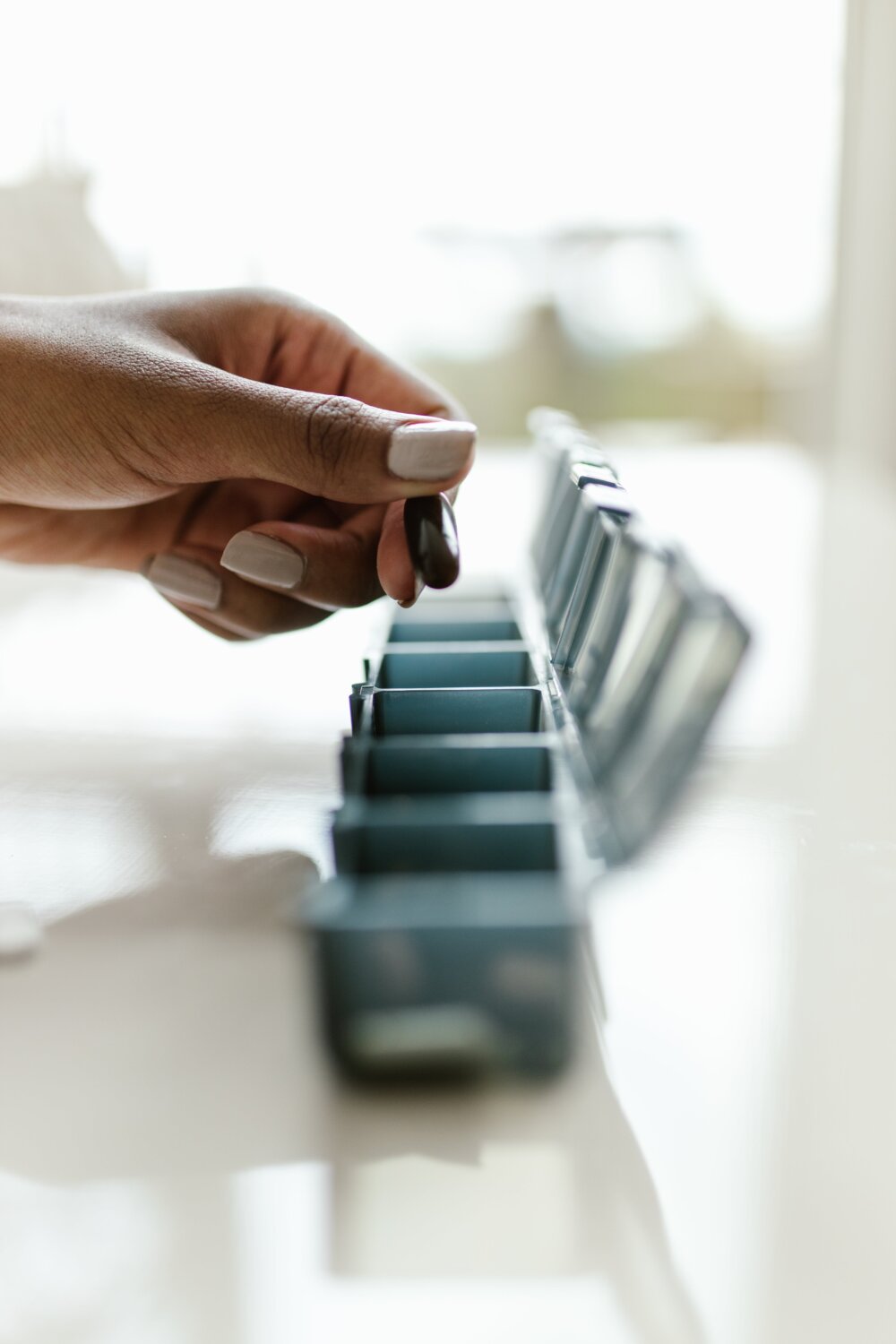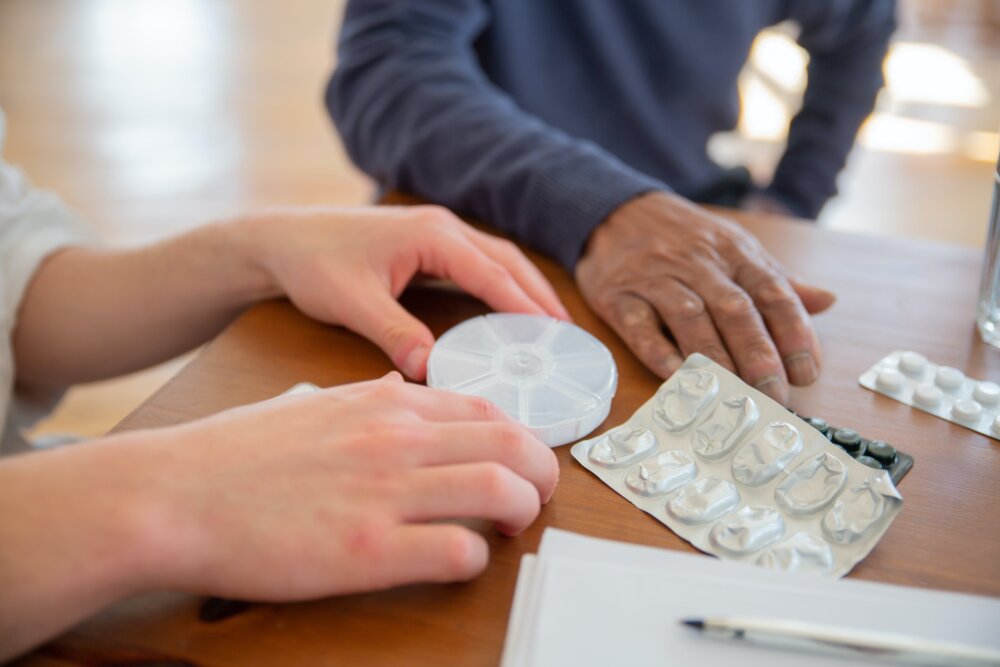How To Use A Dosette Box

If you have a lot of medication to take every day, a dosette box could be the solution. Here, we are answering all your questions about what these boxes are, who can benefit from using one, how to get one, and other tips for remembering to take medication. Whether for yourself or for a loved one, this is your guide to obtaining and using a dosette box. At Home Instead, our aim is to help people age positively and in place by bringing expert care to their home. For nearly 20 years, we have been providing the highest standard of care, and creating industry-leading training programmes for our Care Professionals that are accredited by nursing and medical professionals. Today, we are the world’s largest global home care network, supporting over 100,000 older adults with personalised, tailored care at home. So whatever questions you have about arranging home care services, we can help.
What is a dosette box?
Sometimes referred to as a ‘blister pack’, a dosette box is a plastic tray that allows medications to be arranged into separate, clearly labelled compartments in order to make it easier to remember which ones to take and when. It’s called a dosette box because ‘dosette’ is French for ‘pod’, and the boxes contain a number of pods or compartments for medication. Usually these are arranged into different days of the week, and different times of the day. This labelling makes it clear if you happen to have missed a day of medication, and some dosette boxes also come with handy alarms to remind you to take your medication at a specific time. If you are interested in knowing more about medication timings and the abbreviations on medicine packaging, you may find our guide on this helpful: A Guide To Common Medical Abbreviations On Prescriptions

Who fills a dosette box?
Dosette boxes can be bought by individuals, so if you buy one you can fill it yourself with your own medications. Many people like to count out the required medications at the start of each week, and arrange them correctly in their dosette box so they don’t have to think about it for 7 days. This lets them easily spot if they have missed any days. A self-filled dosette box is appropriate for those who have the mental and physical capabilities to be in control of their own medication – i.e. it is used as a reminder system, and there is no risk of the individual mixing up medications or taking more/less than is required. Dosette boxes can also be filled by a pharmacist who will arrange your prescriptions in the dosette box and either deliver it to you pre-filled, or you or a loved one may pick it up from the pharmacy. These are often renewed every month or sometimes every 7 days, and usually come in one-use dosette boxes where you will break the seal to take your medication on the relevant day, and throw the pack away once it is fully finished. This may be used for someone who needs to have their medication handled by a professional due to issues understanding or remembering which medications to take and when. They can also be helpful for those with mobility or dexterity issues who struggle to open the child-proof bottles most medications come in. If you have home care arranged, it will depend on which type of care you are receiving as to whether or not a carer will be involved in your medication schedule. If you have medical care at home, you may be given medications or reminders from your nurse or medical professional. If you have regular at-home care, your carer will not be involved in your medication schedule and will not fill your dosette box, but they may be able to give you a daily reminder to take medication if you need it. This should be discussed in your Care Plan.

Why might someone use a dosette box?
According to 2019 statistics, 96% of people aged 85+ were taking at least one prescribed medicine, and 56% were taking at least five medicines. If you have a lot of medication to take – particularly if the schedule is a little overwhelming – a dosette box can help. For example, you may need to take some medications daily, some only when symptoms flare up, some first thing in the morning, some only after food, and so on. Thinking about this every day can be mentally exhausting and may lead to missed or incorrect doses, so having a dosette box to arrange only once a week can help you ensure you are taking the right pills at the right times. Dosette boxes are helpful for those who:
- Find it difficult to track their medications
- Have a large number of medications to take daily or weekly
- Have medications to take at specific times of the day
- Are at risk of serious consequences if they forget a dose
- Have conditions requiring extensive medication management, like diabetes or heart disease
- Have conditions affecting memory, such as dementia or Alzheimer’s disease
- Are caring for a loved one with a lot of medication to take
According to a study from 2011, around 50% of people don’t take their medications as prescribed, so a dosette box can offer a simple way to better manage this by making medications visible, and therefore more memorable. Studies have found that patients with chronic mental illness had better adherence to medication when they were given compartmentalised pill boxes and specific guidelines, which is very similar to what a dosette box can offer.

How do you get a dosette box?
A dosette box can be obtained either by purchasing one yourself, or through your pharmacy. You may qualify for one under the Equality Act (2010) if you take a lot of medications every day or find medication management difficult. Speak to your community pharmacy about this if you are having trouble. They will determine your eligibility and, if relevant, arrange your medication in a dosette box. If your home carer is involved in reminding you to take your medication, they will usually only do this for dosette boxes filled by a pharmacist. You can also buy one yourself. These are available in many shops or online, and may be available to buy in your local pharmacy. They may be called a ‘7-day pill box’, ‘pill organiser’ or something similar, and some have a variety of compartments and options so you can choose the one that suits your regime best.
Are dosette boxes free?
As above, you may be eligible for a free dosette box through your local pharmacy. However, these are not always free on the NHS and won’t be suitable for every type of medication, such as liquid medicines. You can speak to your pharmacist to find out what might be available to you.
Do you need a weekly prescription to have one?
Dosette boxes are designed for repeat prescriptions such as medications taken daily or weekly, but you don’t strictly need a weekly prescription to get one. Medications within a dosette box are often provided every 7 days, and will typically have 28 separate compartments which hold medication to be taken across a 7-day week. This means there are 4 compartments for different medications taken at certain times throughout the day – for instance: upon waking, early afternoon, evening, and before bed. Although this is the most common structure for a dosette box, you can get other arrangements to suit different medication schedules, i.e. a box with 56 compartments to cover 2 weeks’ worth of medication, or a box with only 21 compartments for 3 medications a day across 7 days.
Tips for remembering to take medication
When you have a large number of pills to take each day, it can be tiresome to constantly count them out, check the time, double-check if you took the right day’s medication, and so on. If this is something you worry about or you are adding more medications to your daily schedule, there are a few things that can help when remembering what to take and when:
- Use a domiciliary care service – You can have a carer visit your home daily to help with anything you struggle with, such as housework, food shopping or getting washed and dressed in the morning. Depending on what type of home care you receive, your daily carer may be able to help provide medication reminders.
- Set alarms – These can go off at certain times throughout the day so you don’t forget to take medications. If you will be out for the day you can set these on your mobile phone, your watch, or purchase a portable alarm specifically for this purpose.
- Associate points of your day with taking medication – For example, while brushing your teeth, with every meal, or before bed.
- Leave your medication or dosette box in an obvious location – This could be on your kitchen counter where you will see it regularly throughout the day.
- Do not take over-the-counter medicines alongside prescribed medicines unless a doctor or pharmacist has confirmed it’s safe to do so
- If you miss a dose of medicine, it may be dangerous to take multiple doses later, so always consult your doctor or pharmacist straight away if you miss a dose
- If you have leftover medicines, return these to your pharmacist for safe disposal

Tips to help an older relative remember to take medication
If you are caring for an older relative who takes a lot of medication throughout the day, a dosette box can be handy. You can fill this at the start of each week (if you are permitted to do so) and leave them to take their medications safe in the knowledge that they will know what to take and when. Only do this if your loved one is mentally able to understand which medications to take and how often.
If your older relative keeps forgetting to take their medication, try:
- Calling them at certain times as a reminder to take their next dose.
- Purchase an automatic pill dispenser which will beep when it is time to take the next dose of medication, and dispense the right pills.
- Arrange for a home carer to visit at specific times to ensure they are taking their medications. At Home Instead, our home care offering aims to help older adults retain independence and stay in familiar surroundings, and we offer a number of bespoke services which can be tailored to your needs, with Care Professionals highly trained to deliver an individualised service.
If you are caring for someone and are unsure which medications they are supposed to be taking, or have questions about the amount they are taking, you can contact their GP surgery to organise a free structured medication review with their local pharmacist or another healthcare professional.
This review will look at the person’s medications and current health to ensure their medications are still right for them. If your loved one is OK with it, you can attend this appointment with them and ask any questions you have, bring up any concerns (for example, if your older relative is struggling to swallow pills), and understand which medications they should be taking so you can keep on top of this.
We’re an award-winning home care provider and part of a worldwide organisation devoted to providing the highest-quality relationship-led care for older people in their own homes. Arranging care for yourself or your loved one shouldn’t be stressful, so whatever questions you would like answered, feel free to reach out to the Home Instead team to discuss your needs.

Michelle Tennant, Clinical Governance Lead